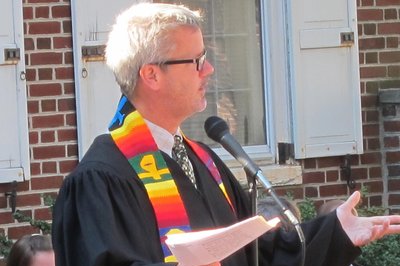Old First Reformed United Church of Christ has long embraced the LGBT community — and will now be led by a member of the community.
The congregation called the Rev. Michael Caine as its first permanent out pastor Nov. 18.
Caine, 51, has served the church as a covenant minister for the past three years; at the completion of that term, he could have moved on or stayed as a settled pastor, a move the congregation unanimously supported.
He came to Philadelphia from New York City, where he served two UCC congregations and spent eight years as the UCC regional conference minister, where he oversaw more than 100 congregations in the area.
That position, however, didn’t allow him enough one-on-one interaction with congregants, he said.
“It was one of those jobs where you get frustrated because you’re seeing people help other people but they don’t do it like you do it, and you feel it’d be more honest if you just go and try it yourself,” he said. “So I decided it was time to go back to the local church community. I was preaching every Sunday but there were a lot of strangers in the pews; it’s a different thing when you actually can get to know the people.”
His search for a new church community led him to Old First, at Fourth and Race streets, where he spent a majority of the last three years working to revitalize the church.
“What I did basically was looked at our tradition and strengths and figure out very specifically the population groups that we thought we could evolve to serve better. They came out to be people who’ve been disappointed by the church by experience or perception, families with small children living in the city, LGBT folks and the 20-35 age group,” he said. “Then, once we identified them, we turned around and asked ourselves, ‘What can we do to make ourselves more friendly to these groups?’”
Caine said that strategy was most effective with the LGBT crowd and the young-adult sector, the largest influx of new members in the past few years.
Old First is fully inclusive of LGBT congregants, offering wedding ceremonies for same-sex couples, fellowship outlets like meet-up groups for gay men and, in 1995, became officially designated as an Open and Affirming congregation for its willingness to welcome all interested members, regardless of factors such as sexual orientation.
Caine grew up in a UCC community in St. Louis, and said his coming-out process, at home and in the church, was seamless.
“We sadly still hear terrible coming-out stories but I had one of those delightful experiences where everyone was like, ‘You’re gay? OK, great,’” he said. “My denomination had been affirming LGBT folks since 1982, and my family was the same way. Growing up in UCC, it just wasn’t an issue, and that’s a different experience than many people have with church.”
Despite the openness of UCC, Caine said he anticipated some resistance when he arrived at Old First — and was happily surprised that he was wrong.
“Whenever a church has a new leader — the first woman pastor or the first pastor who’s ethnically different from the congregation — there’s bound to be someone who freaks out or gets nervous,” he said. “So I asked, ‘What’s the pushback going to be?’ And they just stared at me like I was crazy. And they turned out to be right. There’d been out gay leadership and a presence in the church since the late ’70s, and this just seemed to everyone like the next logical step.”
Caine said he’s looking forward to continuing to expand the reach of the church into underserved populations.
This will require a good deal of education to undo the damage done to the overall image of Christianity by non-inclusive denominations, he said.
“In the last 15 years, the impressions in the U.S. and abroad are that the church is a fundamentally moralistic, conservative, unwelcoming community. Certainly there are aspects of the church that offer a very narrow road, but there’s others of us that consider ourselves equally ‘church,’ and we’re gracious communities that welcome people where they are. So we want to get the word out that not all Christians are of the conservative right,” he said. “And if you can convince people that first, there are liberal, supportive communities who want you to be a part of them, the second part is beginning to speak to an increasingly secular world about what a religious outlook looks like. Those of us in our community find it’s not about who’s right and who’s wrong; basically, none of us try to make ourselves the center of the universe. Religion is bigger than all of us.”

